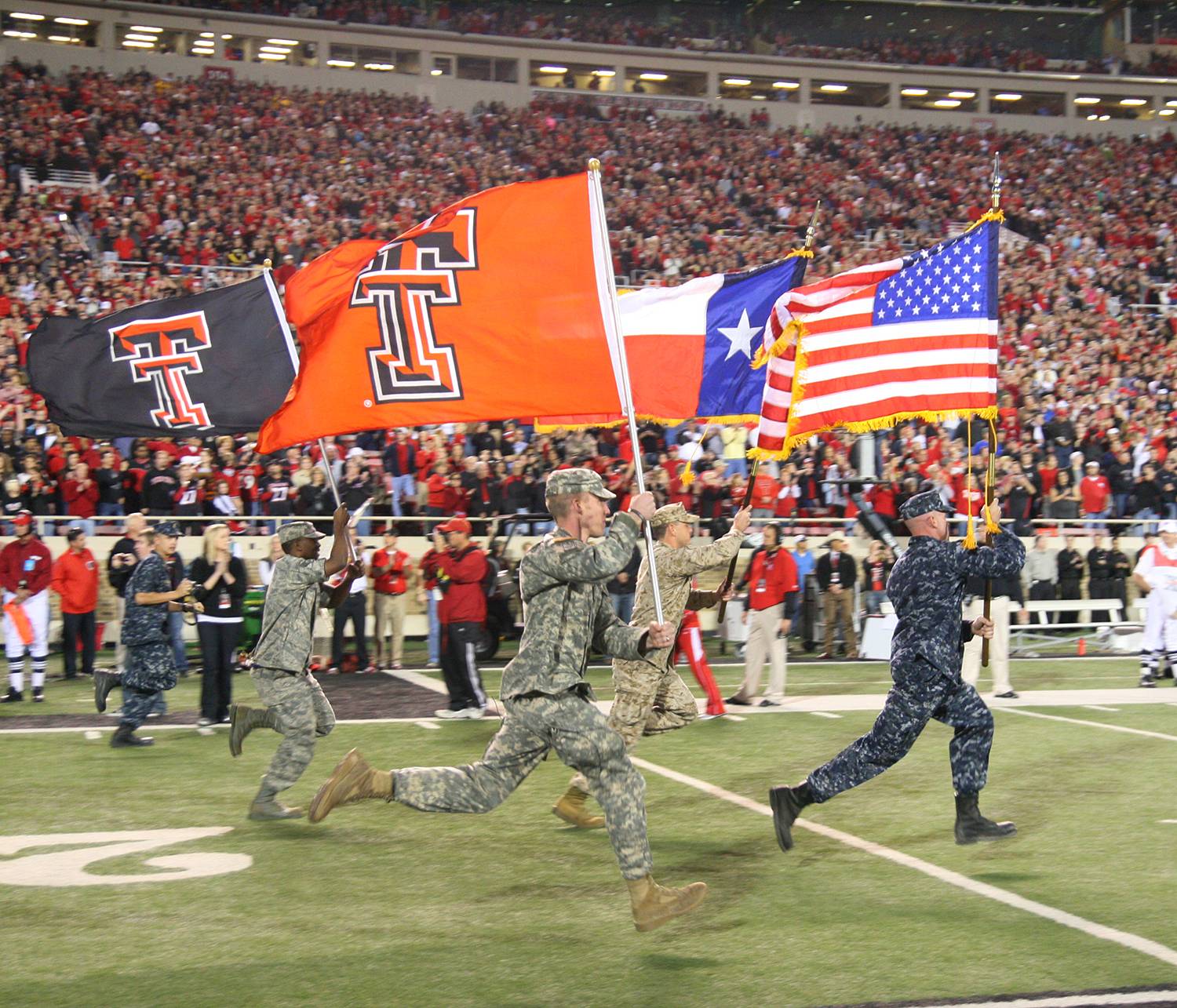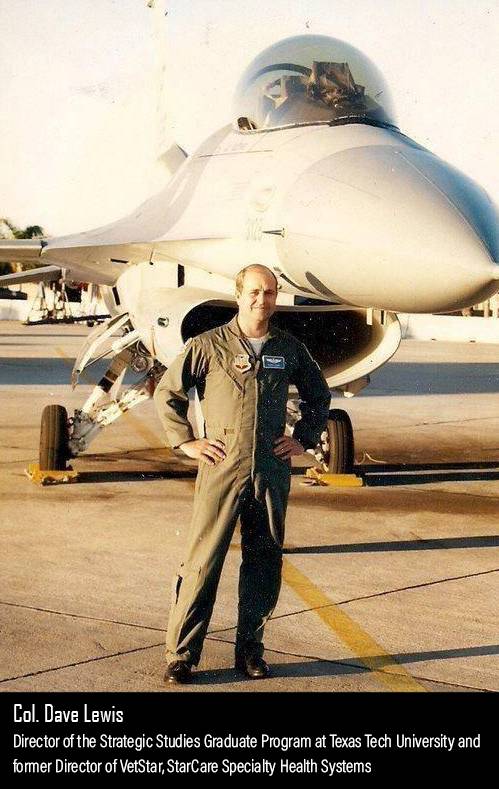
A partnership between Texas Tech’s Department of Political Science and numerous government, health, and community organizations provides veterans greater opportunities.
FACING CHALLENGES
Upon returning home, many veterans' transitions are stalled due to factors such as post-traumatic stress disorder (PTSD), substance abuse, sexual trauma, traumatic brain injury, or moral injury. Some veterans struggle with family challenges, homelessness, or suicidal thoughts. Traditional methods of justice, social work, and mental health are not always effective because of the need for cultural competencies associated with a veteran population. Thanks to a partnership between Texas Tech's Department of Political Science and numerous government, health, and community organizations, veterans in the Lubbock region now have many options to address stalled transition issues and have a greater opportunity to become productive citizens in their communities.
THE LAUNCH OF A PARTNERSHIP
 The partnership began its formation in 2011 when the Local Mental Health Authority
approached Colonel Dave Lewis, Director of the Strategic Studies Graduate Program at Texas Tech University, with
the need to implement and execute a Department of State Health Services grant for
a veterans peer program. As the partners collectively recognized the need for veterans
in the community, more grant funding was secured, and eventually eighteen full-time
positions were established. Additional partnerships were developed with the Lubbock
County Detention Center, Lubbock Police Department, Lubbock County Office of Dispute
Resolution, Lubbock Sheriff's Department, South Plains Homeless Consortium and several
contracted mental health providers. Other organizations such as the U.S. Department
of Veterans Affairs (VA) and Veterans Serving Organizations were recruited as well.
This engagement ultimately resulted in the creation of VetStar, which became the veterans
division of StarCare Specialty Health Systems. The gradual refinement of veterans
service delivery procedures ultimately resulted in the creation of the FASTRR (Find,
Assess, Stabilize, Treat, Reassess & Reintegrate) service delivery strategy. It has
enabled struggling veterans to reintegrate in the community, thus becoming successful
students, employees, and engaged productive members of their communities. The model
is now nationally recognized and has been briefed to the U.S. Congress House Veterans
Affairs Subcommittee on Economic Opportunity.
The partnership began its formation in 2011 when the Local Mental Health Authority
approached Colonel Dave Lewis, Director of the Strategic Studies Graduate Program at Texas Tech University, with
the need to implement and execute a Department of State Health Services grant for
a veterans peer program. As the partners collectively recognized the need for veterans
in the community, more grant funding was secured, and eventually eighteen full-time
positions were established. Additional partnerships were developed with the Lubbock
County Detention Center, Lubbock Police Department, Lubbock County Office of Dispute
Resolution, Lubbock Sheriff's Department, South Plains Homeless Consortium and several
contracted mental health providers. Other organizations such as the U.S. Department
of Veterans Affairs (VA) and Veterans Serving Organizations were recruited as well.
This engagement ultimately resulted in the creation of VetStar, which became the veterans
division of StarCare Specialty Health Systems. The gradual refinement of veterans
service delivery procedures ultimately resulted in the creation of the FASTRR (Find,
Assess, Stabilize, Treat, Reassess & Reintegrate) service delivery strategy. It has
enabled struggling veterans to reintegrate in the community, thus becoming successful
students, employees, and engaged productive members of their communities. The model
is now nationally recognized and has been briefed to the U.S. Congress House Veterans
Affairs Subcommittee on Economic Opportunity.
IMPACTS ON VETERANS AND COMMUNITY
The impacts of the engagement partnership and FASTRR on veterans and the community have been significant. It has enabled over 4,000 military veterans in the Texas South Plains and Panhandle regions to gain access to resources during their transition from military to civilian life. Over 250 homeless, or at risk of becoming homeless, veterans and families have been housed in a thirty-county area. Over 2,000 justice involved veterans were identified, and approximately 700 were approached for services through a 20-county area. Of those who accepted offered services, a six percent recidivism rate was documented. Veterans who self-identified with substance use issues used to wait months before treatment; now, VetStar tracks the number of open beds in the VA system and frequently transports veterans directly from detention centers to treatment. One of the greatest improvements has been the result of suicide prevention measures for veterans. Over fifty total interventions have been made, and there have been zero suicides by veterans who have been treated through the VetStar program. Over 1,000 veterans have received emergency financial assistance and nearly fifty low-income and disabled veterans and families have received housing repairs and modifications. The Housing First Model has expanded into a thirty-county service area including Lubbock and Amarillo.
IMPACTS ON THE UNIVERSITY
University impacts were significant as well. As a result of the knowledge gained from the "boots on the ground" perspective in the community, the Texas Tech Institute for Peace and Conflict created new undergraduate and graduate coursework for Veterans Cultural Competency, which is the foundation for a new Graduate Certificate in Veterans Studies, the first of its kind in Texas. The Certificate Program will bring additional culturally-competent mental health and social workers into the workforce as society continues to face challenges in transitioning veterans into families and communities. Moreover, undergraduate and graduate social work practicum students are being trained at VetStar and graduate student internships are occurring as well. The largest gap identified throughout this project involved the lack of treatment options for over 400,000 traumatic brain injury (TBI) affected warriors, and efforts are now underway to incorporate advanced healing techniques, such as hyperbaric oxygen treatment and neuroplasticity, to address these challenges. Efforts are underway on both the Texas Tech University and TTU Health Sciences Center campuses to recruit researchers interested in successfully addressing the TBI challenge. Combined with clinical research in PTSD, both initiatives have the potential to significantly alter mental health treatment for veterans and their families. "When I retired from the Air Force after twenty-nine years of service, I began to see the gaps in services and benefits for our returning warriors. I started 'turning over rocks,' and found there was much to be done in the community. Most veterans transition without any problems, but some of our veterans face a new battlefield when they come home – one they were not trained for. We know how to help them." Col. Dave Lewis Director of the Strategic Studies Graduate Program at Texas Tech University and former Director of VetStar, StarCare Specialty Health Systems The scholarship and service delivery model developed under this partnership has garnered the attention of several large national-level consortiums (America's Warrior Partnership, Veterans Treatment Alliance, VetCV, and TreatNow.org), as well as state-level interest from Health and Human Services Commission, Texas Veterans Commission, Texas Commission on Jail Standards and the Texas Jail Association. The House Veterans Affairs Subcommittee on Economic Opportunity is looking to incorporate much of the knowledge gained in this project in its revamping of the warrior transition process through partnership with the U.S. Department of Defense, Veterans Affairs, and Department of Labor.
Project Leader:
Col. Dave Lewis, Director of the Strategic Studies Graduate Program at Texas Tech University and
former Director of VetStar, StarCare Specialty Health Systems
